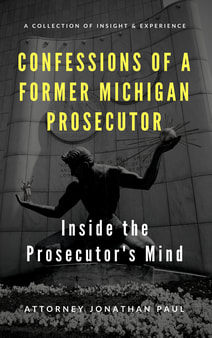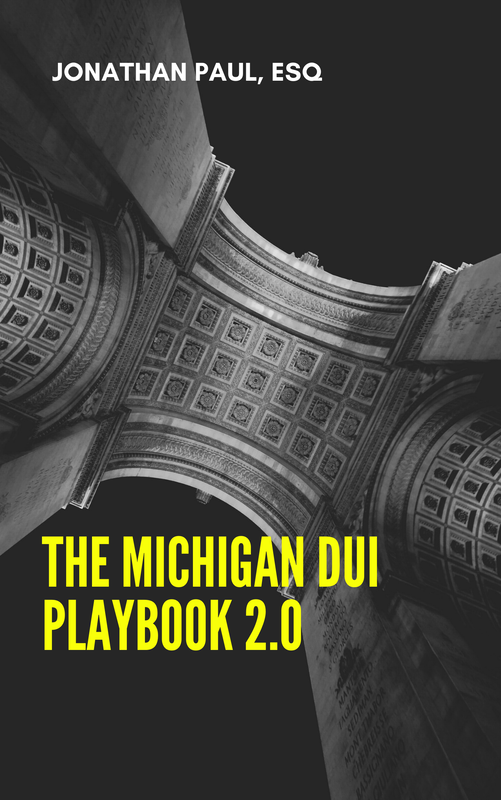Getting to the truth on a DUI case in Michigan - The Datamaster Machine doesn't know what your BAC8/7/2017
 When I work on a DUI case in Michigan with a Datamaster result, I always look at the different times in the police reports and evidence. 1 - I look for the first police contact time 2 - I look for what test an arrest was made 3 - I look for what time a PBT was done 4 - I look for what time chemical test rights were read 5 - I look for start of the observation time 6 - I look for the times that the Datamaster tests were done - there's usually two of them The first police contact is the first moment that we can be assured that my client is not drinking, and therefore we can start the clock on time between last drink and the Datamaster. It's very likely more time than this has gone by, but that's a case by case issue. Let's say, the traffic stop happened at 2 am, and the first Datamaster test is at 3:03 am. With about an hour gone by, the blood level is either at it's maximum level from drinks right before the traffic stop, or on the decline as alcohol was at its peak when the stop was made. If the prosecutor can't provide the timing on the last drinks, a jury is left to wonder, and a good defense is ready to be made about reasonable doubt as to that level. The Datamaster machine looks at your BAC level at the police station, the number will always be higher or lower than the number when you were driving; jury instructions are provided that tell a jury that can infer the number is the same, but common sense, and a good defense will point out that it lacks common sense, and probably should not be followed. If you're charged with drunk driving in Michigan, you may decide to proceed to trial. The most effective way of winning your DUI trial in Michigan is through cross-examination of the prosecutor's witnesses.
Michigan drunk driving cases start with a police officer believing the Defendant to be the driver of a motor vehicle. If the officer observes the Defendant driving the vehicle then it may be difficult to challenge this observation unless you can prove the officer is either lying or mistaken. If the police officer does not actually observe the Defendant driving, such as an accident case or an idle vehicle on the side of the road or parking lot, it's possible to aggressively attack this element to the crime. In cross-examination, a defense attorney uses leading questions, which require yes or no responses. The goal here is to show that the officer actually does not know whether the charged Defendant was driving the vehicle. Let's call the driver Mr. Damon, and Mr. Damon is standing outside of the car when the police arrive. Here is a mock cross-examination on the issue of operation. - Officer did Mr. Damon tell you he was driving the vehicle? NO - You didn't see Mr. Damon driving the vehicle? NO - You didn't see Mr. Damon in the car at all? NO - You didn't see him behind the wheel? NO - You didn't see him with the keys in the ignition? NO - In fact there are no eyewitnesses, including yourself that say Mr. Damon was driving? Correct - So all you can tell the court is that you saw my client Mr. Damon standing outside of a car? Right - So when you arrested my client for drunk driving, you were just assuming he was the driver? Right - But you actually don't know for sure? Well he was the only person there, and he was standing next to the vehicle - The question was, you're assuming he was the driver, you don't know he was? Right - So it's possible Mr Damon was not driving that vehicle? It's possible Here the police officer cannot say for sure whether Mr. Damon was the driver, and that creates a reasonable doubt to one of the elements to the crime. If Mr. Damon doesn't admit to driving, it's not a slam dunk for the prosecution to prove this element. Most drivers will actually admit to driving, which makes the prosecutor's job a lot easier to prove operation. If the prosecution cannot prove beyond a reasonable doubt that you were operating the vehicle, then you are entitled to an acquittal. Once the issue of operation has been explored, the prosecution is going to have the officer testify to his/her observations of you, such as smell of alcohol, red/watery eyes, slurred speech, couldn't follow instructions and field sobriety tests. The prosecution and police officer would have the jury believe that combined these observations equate to the defendant being intoxicated and guilty of a crime. The key to approaching this testimony is to break each observation into its own line of questioning. Your attorney will go through each observation, and gain concessions from the police officer to common sense explanations. One easy to understand example is the issue of red eyes; surely the very same officer has experienced red eyes in a non-intoxicated state at some point in their life. This explanation is especially effective if the observation took place late at night or early in the morning. If the officer refuses to acknowledge the alternative explanations, he/she will lose credibility with the jury. Each one of these observations has an alternative explanation, but are usually not mentioned or considered, because the job of police officer is to collect evidence of a crime. This doesn't make the officer a liar, or even an unfair person, he/she is simply doing her job as part of the government system. The very same line of questioning can be used to challenge probable cause to arrest, which if successful could lead to an outright dismissal of your case. It's very common, almost a guarantee that you will be asked to take a series of field sobriety tests, and be marked as failing each and every test. An experienced Michigan DUI attorney will cross-examine the officer by pointing out the conditions which the tests were given, the inherent difficultly of the tests, and the subjective nature of the tests. The conditions at the scene are usually at night, in the dark, and on the side of a road in unfamiliar conditions. In addition to the less than ideal conditions, the subject of these tests is under a lot of stress and frightened. If an accident is involved, the subject mat be injured and not physically able to do well on the tests. The odds are stacked against the defendant, and the jury needs to know about it. Here is a brief sample of an effective cross-examination of the arresting officer who only administered one field sobriety test before concluding the driver was intoxicated: - Officer, you stated on direct examination that you had my client perform a field sobriety test, which involved my client touching his nose with his right hand, then his left hand - Yes that's correct - And this is the only field sobriety tests you had him perform? - Yes only one Your attorney would then go through the different field sobriety tests that were not performed one by one, and the officer would acknowledge that he failed to give any other tests. This line of questioning can then be argued in closing argument that the officer rushed to judgment, and once he had a failing result stopped all tests to keep a strong case against the defendant, which was certainly unfair. If you've been arrested for drunk driving in Michigan, and subjected yourself to a breath test via DataMaster, your Michigan DUI attorney will then thoroughly cross-examine the prosecution's DataMaster operator. Most DataMaster operators in Michigan have very limited training and information to offer about the machine used to obtain a breath sample. The operator is simply trained to use the machine to get a result, not necessarily understand it. The operator will have to acknowledge the very limited initial training and lack of follow-up training. This lack of extensive training provides fruitful grounds for cross-examination. Besides a general lack of training and knowledge by the officer, your attorney will be able to explore specific lack of knowledge by the officer. There are a number of lines of questioning that can shed light on the possibility that the tests were not accurate, and without enough knowledge to respond to these possibilities, the jury may have no choice, but to find these tests are not accurate beyond a reasonable doubt. A fruitful area of cross-examination is the operators lack of knowledge if the machine is working properly. The operator will surely say the machine was built to inform the operator if it is not working, but most operators have not checked whether this safeguard actually works; if the test itself can have an error, so can the mechanism that identifies errors. DataMaster operators are not trained to identify errors, which leaves a major hole in their testimony. This is like someone knocking on your front door and telling you there is a fire in your home, but you respond with "no there's not, my smoke alarm would have told me about a fire". Another fruitful line of questioning are the calibration records contained in a log book; the DataMaster is inspected and calibrated about every two weeks, but the operator is not trained to calibrate or inspect the machine when offering a test so there is no way to know if the machine is working properly during the days in-between. There is reasonable doubt that the machine was working properly between calibrations, and the operator cannot firmly counteract that possibility. Creating reasonable doubt as the accuracy of the results can be very effective in a case where the test results are close to the legal limit of 0.08 for an Operating While Intoxicated charge, or the legal limit of 0.17 for a Michigan High BAC charge. The prosecution may have civilian witnesses testify against you. These witnesses might be other drivers, pedestrians or employees of bars and restaurants. The common theme with these witnesses is typically inexperience in testifying. Civilian witnesses typically testify to offer prove that the defendant was driving, usually in an accident case. The typical civilian witness is subpoenaed to court, carefully prepared by the prosecution, and feels a civic duty to "help" the prosecution prove their case. This witness might testify about driving, observations of possible intoxication and any statements made by the defendant. If this witness is injured or property is damaged then they will testify about injuries or the damage suffered from the incident. As the defendant in the case, you will have the best information about this civilian witness; you may also have information about pending lawsuits, and based on your prior interactions, the general demeanor of this witness toward your case. While it's not common, there are plenty of DUI cases in Michigan where the police arrive at the scene and there is no "driving" taking place. The person is actually outside the car, the car engine is probably off, and they are simply waiting around for the police or for a repair truck.
In this type of case, the prosecution is going to have an issue with trying to prove beyond a reasonable doubt that you were indeed driving the car. Hopefully, the suspect DID NOT make an admission to the police about driving the car, which will be strong evidence against. So the first thing to do is point out that no admission was made, and the officer has no personal direct knowledge of driving. Attorney: Officer Smith, did my client state at any time that he was the driver of the Jeep Cherokee Officer: No, he did not Attorney: And you never saw my client driving, correct? Officer: Correct Attorney: And you never actually saw him behind the wheel Officer: Correct Attorney: You in fact never even saw him in the car Officer: Right, I didn't see that Attorney: In fact, nobody called 911 or reported anything to do with the Jeep Cherokee or my client Officer: Correct Attorney: The car wasn't running when you arrived, the lights weren't on, in fact the doors were both closed. Officer: Yes that's correct Attorney: In fact, the only basis for making a DUI arrest of my client is because he was near the car Officer: Right, that's why I arrested him Attorney: So while it's possible he was the driver as you assumed, it's just as likely that he had nothing to do with the car. Officer: I thought he was the driver, but yes both are possible I guess. In this scenario the officer has provided exactly what you need to win a DUI case in Michigan. The officer admitted that he wasn't sure who the driver was, and there are two just as likely scenarios, which the jury should conclude is reasonable doubt to acquit, or even for a judge to order a directed verdict due to the prosecutor not being able to prove one of the elements of the offense. How to Cross-Exam the Datamaster Operator to Create Reasonable Doubt in Your Michigan DUI Case2/22/2016
There's a trend in Michigan that DUI cases are not going to trial. The reason is most clients and attorneys will look at the BAC level, see that it's above the legal limit and run to plead guilty. Now there's always a time to cut the best deal on a DUI case, but not before a careful examination of your defense.
One of these defenses is attacking the BAC results by attacking the DataMaster with cross-examination of it's operator. Here is an example of an effective line of questioning: Why does your training manual want you to know whether my client had a temperature? Why does your manual want to know whether my client was taking medication? Why watch an individual for 15 minutes before the test? Why do you have 15-minute observation periods if the machine can detect mouth alcohol? How does the machine know the difference between air in the mouth and air in the lung? Is the alcohol in the upper lung different than in the lower lung? Is alcohol constant in the human body? How fast can a person’s blood alcohol go up? What does verified mean on the evidence ticket? What is the tolerance of the internal standard? How do radio frequency waves affect the test results? How often is the machine sensor tested for RFI? How sensitive is the RFI sensor? Why do the logs only reflect verification at .08 percent? Why not other levels, such as .15 percent or .20 percent? Based on the DataMaster’s results, what was my client’s BrAC at the time of the driving? Can you state beyond a reasonable doubt, based on the DataMaster’s result, that my client was above .08 percent BAC at the time of the driving? |
Click to Email Me Categories
All
|
Ann Arbor Office LocationPlymouth Office Location |
Representing DUI Clients in MichiganRepresenting clients charged with a DUI in Ann Arbor, Canton, Brighton, Howell, Saline, Adrian, Taylor, Plymouth, Northville, Westland, Ypsilanti, Pittsfield Towsnhip, Warren, Sterling Heights, Farmington, Pontiac, Romulus, Lansing, Novi, South Lyon, Southfield, Birmingham, Bloomfield Hills, Royal Oak, Troy, Rochester, Jackson, East Lansing, Garden City, Livonia, Dearborn, Detroit, St Clair Shores, Hazel Park, Ferndale, Madison Heights, Waterford, Milford, Shelby Township Clarkston, Oak Park, Berkley, Fraser, Sterling Heights, Clinton Township and others throughout Washtenaw, Wayne, Monroe, Jackson, Genesee, Macomb, Ingham, Lenawee, Livingston and Oakland County.
|







